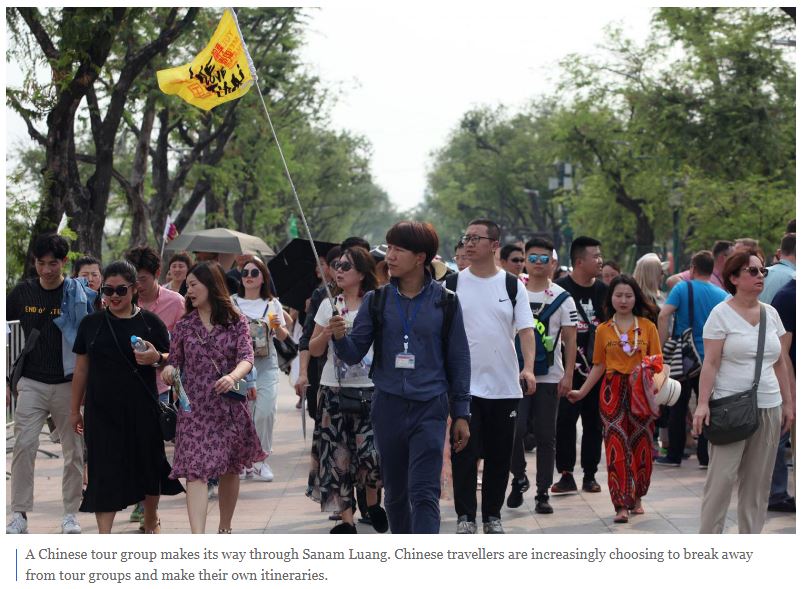Thailand: Operators look for ways to regain the China market
Several challenges beset Thailand’s tourism industry in the first half of 2019, especially the fading China market after a slowdown stemming from the sluggish global economy and trade tensions between the world’s two biggest economies.
The soaring baht against major currencies, including the yuan, is another worrying issue that could deter Chinese from travelling here.
Visitors from China fell by 4.3% to 4.8 million in the first five months of the year, according to data from the Tourism and Sports Ministry.
The latest figures from the Association of Thai Travel Agents (Atta) showed that Chinese tourists who travelled in groups through Atta members plunged 15% to 1.62 million visitors in the first half of the year.
Though the peak season is approaching and the mainland market could revive, Thai operators are advised to look at new market segments and use digital tools to regain Chinese tourists.
Senior moment
At a recent seminar on the theme “China-Ready”, co-organised by the Tourism and Sports Ministry, Asean China Centre, Guilin Tourism University and Beijing Union University, academics suggested Thai operators place greater focus on the silver market, or tourism for senior travellers.
Wang Yajuan, a professor at Guilin Tourism University, said the elderly market will become a new growth point as China’s ageing population increases. She said some 20% of Chinese travellers are senior citizens who travel at least four times a year, both domestically and overseas.
Prof Wang estimates the value of silver tourism in 2025 at 34 trillion yuan and sees the market continuing to rise at 7.3% year-on-year in the next 30 years.
“Most silver-age tourists tend to travel in groups with their family and friends, while some 14% of senior travellers prefer travelling alone,” she said. “They have no travel season because they have long stretches of free time after retirement, unlike teenagers who travel during school breaks.”
Operators who want to access the market should manage services with proper travel schedules and should not run continuously for more than two hours per schedule, allowing spare time to relax during trips.
Chinese-speaking tour guides with medical knowledge and free WiFi enabling the use of WeChat and Alipay are essential.
FIT to travel
With Chinese tour groups on the decline, arrivals in the form of FITs or free independent travellers are edging up.
A report by Kueclub and Tencent Research said that some 806 million Chinese will use WeChat this year for the purpose of chatting, keeping photo moments and receiving news.
To serve the FIT market efficiently, the Tourism Authority of Thailand (TAT) in China has created an official account on WeChat to respond to social media among Chinese.
Charan Chuennaitham, the director of the TAT’s Chengdu office, said the official account on WeChat aims to provide a digital tool that connects the China market with Thailand’s tourism industry.
Apart from news updates from the TAT, Chinese travellers can contact 218 Chinese travel agents stationed at TAT offices in Beijing, Shanghai, Guangzhou, Kunming and Chengdu.
Tourism products in Thailand can be featured on the platform for hotels, travel agencies, restaurants, theme parks and other attractions.
Tourists are also able to search for specific travel experiences from the theme menu, which consist of sports tourism, gastronomy tourism, luxury tourism and honeymoon locations in Thailand.
Preparing for benefits
Sumalee Wongcharoenkul, Atta’s honorary secretary-general, said the elderly market could become a new segment for Thai tourism that cannot be missed, since many countries are becoming ageing societies (including Thailand).
But there’s a lot of work to do to prepare for this type of tourism, which has to be handled with care, she said.
There are two types of senior Chinese tourists visiting Thailand, classified by their length of stay. The first group combines general travellers and quality tourists, or those who come for medical tourism or health and wellness.
The second group consists of long-stay seniors who use non-immigrant O-A visas for a period of up to one year. They usually come to visit their children who work and study in Thailand and travel every once in a while.
Catering to the elderly market is a little different from typical tour operations. Most tour operators overlook this point.
Ms Sumalee said tourist destinations in Thailand still lack facilities for elderly travellers such as wheelchair-friendly amenities.
To embrace the niche tourism market effectively, Ms Sumalee suggests that tour agencies and other involved parties design new routes for them and highlight the destinations on their websites.
Atta president Vichit Prakobgosol said tour operators have to think beyond traditional tour packages and offer customised and more flexible tour programmes.
They should provide smaller vehicles like vans instead of big buses for small groups of tourists. Boutique hotels and local homestays should be offered alongside three- to six-star hotels.
“A one-day trip such as shopping and cultural sightseeing should be added together with Thai cooking classes and Thai boxing classes,” Mr Vichit said. “Operators should monitor tourists’ behaviour closely and adjust business to fit them.”
Source: https://www.bangkokpost.com/business/1708703/operators-look-for-ways-to-regain-the-china-market


 English
English




